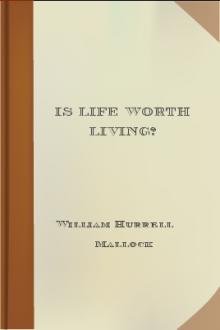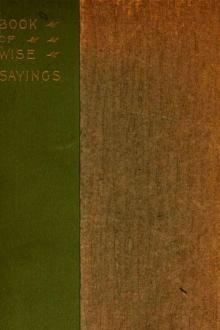Is Life Worth Living?, William Hurrell Mallock [if you give a mouse a cookie read aloud txt] 📗

- Author: William Hurrell Mallock
- Performer: -
Book online «Is Life Worth Living?, William Hurrell Mallock [if you give a mouse a cookie read aloud txt] 📗». Author William Hurrell Mallock
Now if we examine its value by these tests, the result will be somewhat startling. We find that not only are mankind at large as yet but very partially aware of its consequences, but that its true scope and meaning has not even dawned dimly on the leading thinkers themselves. Few spectacles, indeed, in the whole history of thought are more ludicrous than that of the modern positive school with their great doctrine of verification. They apply it rigorously to one set of facts, and then utterly fail to see that it is equally applicable to another. They apply it to religion, and declare that the dogmas of religion are dreams; but when they pass from the dogmas of religion to those of morality, they not only do not use their test, but unconsciously they denounce it with the utmost vehemence. Thus Mr. Leslie Stephen, in the very essay from which I have just now quoted, not only has recourse, for giving weight to his arguments, to such ethical epithets as low, lofty, and even sacred, but he puts forward as his own motive for speaking, a belief which on his own showing is a dream. That motive, he says, is devotion to truth for its own sake—the only principle that is really worthy of man. His argument is simply this. It is man's holiest and most important duty to discover the truth at all costs, and the one test of truth is physical verification. Here he tells us we find the only high morality, and the men who cling to religious dream-dogmas which they cannot physically verify, can only answer their opponents, says Mr. Stephen, 'by a shriek or a sneer.' 'The sentiment,' he proceeds, 'which the dreamer most thoroughly hates and misunderstands, is the love of truth for its own sake. He cannot conceive why a man should attack a lie simply because it is a lie.' Mr. Stephen is wrong. That is exactly what the dreamer can do, and no one else but he; and Mr. Stephen is himself a dreamer when he writes and feels like this. Why, let me ask him, should the truth be loved? Do the 'perceptions,' which are for him the only valid guides, tell him so? The perceptions tell him, as he expressly says, that the truths of nature, so far as man is concerned with them, are 'harsh' truths. Why should 'harsh' things be loveable? Or supposing Mr. Stephen does love them, why is that love 'lofty'? and why should he so brusquely command all other men to share it? Low and lofty—what has Mr. Stephen to do with words like these? They are part of the language of dreamland, not of real life. Mr. Stephen has no right to them. If he has, he must be able to draw a hard and fast line between them; for if his conceptions of them be 'vague in outline' and 'unsubstantial,' they belong by his own express definition to the land of dreams. But this is what Mr. Stephen, with the solemn imbecility of his school, is quite incapable of seeing. Professor Huxley is in exactly the same case. He says, as we have seen already, that, come what may of it, our highest morality is to follow truth; that the 'lowest depth of immorality' is to pretend to believe what we see no reason for believing;' and that our only proper reasons for belief are some physical, some perceptible evidence. And yet at the same time he says that to 'attempt to upset morality' by the help of the physical sciences is about as rational or as possible as to 'attempt to upset Euclid by the help of the Rig Veda.' Now on Professor Huxley's principles, this last sentence, though it sounds very weighty, is, if so ungracious a word may be allowed me, nothing short of nonsense. It would be the lowest depth of immorality, he says, to believe in God, when we see that there is no physical evidence to justify the belief. And physical science in this way he admits—he indeed proclaims—has upset religion. How then has physical science in the same way failed to upset morality? The foundation of morality, he says, is the belief that truth for its own sake is sacred. But what proof can he discover of this sacredness? Does any positive method of experience or observation so much as tend to suggest it? We have already seen that it does not. What Professor Huxley's philosophy really proves to him is that it is true that nothing is sacred; not that it is a sacred thing to discover the truth.
We saw all this already when we were examining his comparison of the perception of moral beauty to the perception of the heat of ginger. It is the same thing with which we are again dealing now, only we are approaching it from a slightly different point of view. What we saw before, was that without an assent to the religious dogmas, the moral dogmas can have no logical meaning. We have now seen that even were the two logically independent, they yet belong both of them to the same order of things; and that if our tests of truth prove the former to be illusions, they will, with precisely the same force, prove the same thing of the latter.
But the most crucial test of all we have still to come to, which will put this conclusion in a yet clearer and a more unmistakable light. Thus far what we have seen has amounted to only this—that if science can take from man his religious faith, it leaves him a being without any moral guidance. What we shall now see is that, by the same arguments, it will prove him to be not a moral being at all; that it will prove not only that he has no rule by which to direct his will, but also that he has no will to direct.
To understand this we must return to physical science, and to the exact results that have been accomplished by it. We have seen how completely, from one point of view, it has connected mind with matter, and how triumphantly it is supposed to have unified the apparent dualism of things. It has revealed the brain to us as matter in a combination of infinite complexity, which it has reached at last through its own automatic workings; and it has revealed consciousness to us as a function of this brain, and as altogether inseparable from it. But for this, the old dualism now supposed to be obsolete would remain undisturbed. Indeed, if this doctrine were denied, such a dualism would be the only alternative. For every thought, then, that we think, and every feeling or desire that we feel, there takes place in the brain some definite material movement, on the force or figure of which the thoughts and feelings are dependent. Now if physical observations are to be the only things that guide us, one important fact will become at once evident. Matter existed and fermented long before the evolution of mind; mind is not an exhibition of new forces, but the outcome of a special combination of old. Mental facts are therefore essentially dependent on molecular facts; molecular facts are not dependent on mental. They may seem to be so, but this is only seeming. They are as much the outcome of molecular groupings and movements as the figures in a kaleidoscope are of the groupings and movements of the colored bits of glass. They are things entirely by the way; and they can as little be considered links in any chain of causes as can the figure in a kaleidoscope be called the cause of the figure that succeeds it.
The conclusion, however, is so distasteful to most men, that but few of them can be brought even to face it, still less to accept it. There is not a single physicist of eminence—none at least who has spoken publicly on the moral aspects of life—who has honestly and fairly considered it, and said plainly whether he accepts it, rejects it, or is in doubt about it. On the contrary, instead of meeting this question, they all do their best to avoid it, and to hide it from themselves and others in a vague haze of mystery. And there is a peculiarity in the nature of the subject that has made this task an easy one. But the dust they have raised is not impenetrable, and can, with a little patience, be laid altogether.
The phenomenon of consciousness is in one way unique. It is the only phenomenon with which science comes in contact, of which the scientific imagination cannot form a coherent picture. It has a side, it is true, that we can picture well enough—'the thrilling of the nerves,' as Dr. Tyndall says, 'the discharging of the muscles, and all the subsequent changes of the organism.' But of how these changes come to have another side, we can form no picture. This, it is perfectly true, is a complete mystery. And this mystery it is that our modern physicists seize on, and try to hide and lose in the shadow of it a conclusion which they admit that, in any other case, a rigorous logic would force on them.
The following is a typical example of the way in which they do this. It is taken from Dr. Tyndall. 'The mechanical philosopher, as such,' he says, 'will never place a state of consciousness and a group of molecules in the position of mover and moved. Observation proves them to interact; but in passing from one to the other, we meet a blank which the logic of deduction is unable to fill.... I lay bare unsparingly the initial difficulty of the materialist, and tell him that the facts of observation which he considers so simple are "almost as difficult to be seized as the idea of a soul." I go further, and say in effect: "If you abandon the interpretation of grosser minds, who image the soul as a Psyche which could be thrown out of the window—an entity which is usually occupied we know not how, among the molecules of the brain, but which on due occasion, such as the intrusion of a bullet, or the blow of a club, can fly away into other regions of space—if abandoning this heathen notion you approach the subject in the only way in which approach is possible—if you consent to make your soul a poetic rendering of a phenomenon which—as I have taken more pains than anyone else to show you—refuses the ordinary yoke of physical laws, then I, for one, would not object to this exercise of ideality." I say it strongly, but with good temper, that the theologian who hacks and scourges me for putting the matter in this light is guilty of black ingratitude.'
Now if we examine this very typical passage, we shall see that in it are confused two questions which, as regards our own relation to them, are on a totally different footing. One of these questions cannot be answered at all. The other can be answered in distinct and opposite ways. About the one we must rest in wonder; about the other we must make a choice. And the feat





Comments (0)